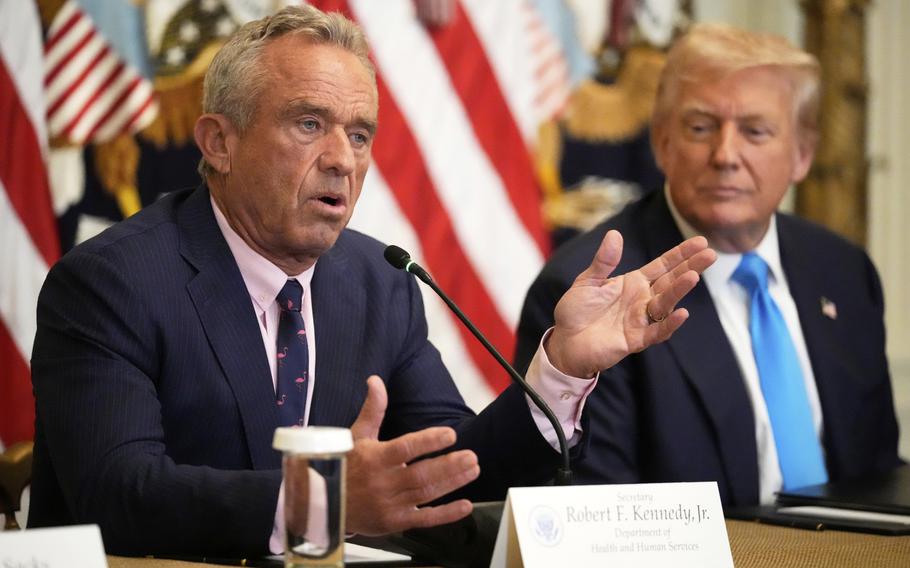
Health and Human Services Secretary Robert F. Kennedy Jr. speaks as President Donald Trump listens at an event in the East Room of the White House, Wednesday, July 30, 2025, in Washington. (Mark Schiefelbein/AP)
As a dad, I’m used to interruptions — from kids bursting in during a quiet moment or to those “battery is low” smoke alarm warnings. Nothing grates quite like those slick pharmaceutical ads blaring across the TV, promising quick fixes while whispering side effects in fine print.
That’s why I’m excited by recent proposals from Robert F. Kennedy Jr. and the Department of Health and Human Services to fight misleading ads by forcing more side-effects transparency and ending tax breaks for pharmaceutical advertising.
A recent Washington Post editorial suggests that advertisements nudge American patients to spot undiagnosed issues and consult their doctor. Does the pharmaceutical industry think the American people are so clueless that we need a commercial to know when we’re feeling off?
Ads don’t encourage thoughtful conversations with primary care physicians — they push viewers toward medication-only solutions and prod us to demand specific drugs, skewing conversations away from lifestyle choices toward pharmaceutical fixes.
It’s more troubling when kids catch these ads, absorbing the idea that every problem has a pill. The United States and New Zealand are the only countries that allow this direct-to-consumer advertising, and that should raise red flags. Why has the entire world caught onto the dangers of this advertising, but the land of the free refuses to nip it in the bud? These ads are not about empowerment; they’re meant to condition us, especially young minds, to see medication as the default.
Worse, these ads aren’t about transparency; they’re about sales. Companies push brand-name blockbuster drugs to increase profits and then write off their advertising costs, sometimes to the tune of $1.5 billion. And let’s not pretend the ads are informative. If they were, why would Big Pharma quickly rattle off the most dangerous side effects at the end of the ad (and in small fine print)? After all, side effects often cause more misery than the ailments they treat, trapping people in a cycle of new prescriptions to fix problems the first ones created.
Kennedy and his HHS team deserve applause for putting patients over profits, fighting for greater transparency related to side effects, and ending advertising tax breaks for pharmaceutical companies. Regardless of who’s leading these efforts, the MAHA movement has exposed Big Pharma’s reluctance to be fully transparent and revealed its priority: keeping us hooked, not healthy.
Real health doesn’t come from a pill bottle but rather from how we live. The Post’s claim that ads keep us healthier ignores the power of natural choices. While science, including the National Institutes of Health, agrees that lifestyle choices are the deciding factor for one’s health, it doesn’t take a peer-reviewed journal to realize the benefits of healthy living.
Recently, my wife and I went kayaking for 90 minutes on a local lake. For a $20 rental, we enjoyed the benefits of exercise, fresh air, vitamin D, and a mental reset that lasted days. At home, our kids love our budget-friendly steam sauna and cold plunge setup — especially after a long day at summer camp. Unlike the false scenes of euphoria and joy depicted in predatory pharma ads, my kids come out laughing, with spirits lifted and zero side effects.
I’m not saying prescriptions are never needed. Diabetics need insulin, and someone in crisis might benefit from temporary anxiety medication. That’s not the reality we live in. Instead, prescription drug use is as much an epidemic as chronic illness. Twenty percent of children are on one or more prescription drugs. The typical American citizen is on at least four prescription drugs. An American male born in 2019 will spend 48% of his life taking prescription drugs, while a female will spend 60% of her time doing the same.
As a parent, these statistics terrify me. They should worry you, too. The goal should be long-term wellness through lifestyle, not lifelong dependency on drugs.
We deserve better than manipulative ads that drown out our instincts. Proposals to limit these ads are a step toward protecting us, especially the kids, from Big Pharma’s grip. Let’s focus on the most effective prescription for a healthier America: moving our bodies, eating well and connecting as families.
Alex Ward is a high school economics teacher and a father.